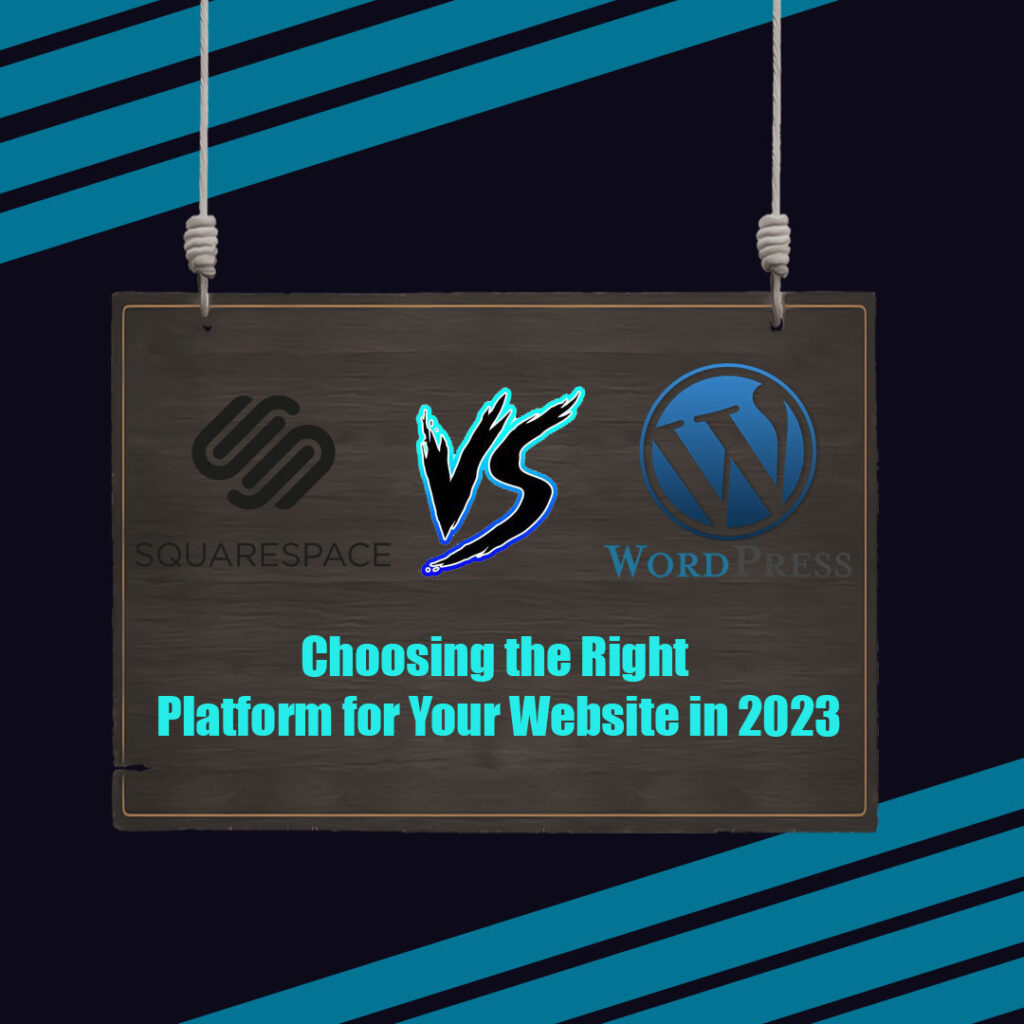
Squarespace vs WordPress: The Right Platform for Your Web
- Markie Mark
- July 8, 2023

Introduction:
In the ever-evolving digital landscape, having a powerful and user-friendly website is essential for individuals and businesses alike. When it comes to building a website, two popular platforms often come to mind: Squarespace vs WordPress. As we step into 2023, it’s crucial to understand the strengths and weaknesses of each platform to make an informed decision about which one best suits your needs.
Squarespace is renowned for its intuitive website builder and stylish templates. With a drag-and-drop interface and seamless hosting, it has attracted millions of users who value simplicity and ease of use. On the other hand, WordPress, a versatile content management system, offers unparalleled customization options and a vast ecosystem of themes and plugins. However, it requires a bit more technical know-how to navigate effectively.
In this blog post, we will delve into the world of Squarespace vs WordPress, exploring their key features, pros, and cons in 2023. By examining their respective strengths and weaknesses, we aim to assist you in making the right choice for your website. Whether you’re a business owner, blogger, or creative professional, understanding these platforms will empower you to create a compelling online presence that aligns with your goals.
Join us as we compare Squarespace vs WordPress, uncovering the optimal platform for your website-building journey in 2023.
1. Squarespace
1.1 Overview of Squarespace
Squarespace is a popular all-in-one website building and hosting platform that enables individuals and businesses to create professional and visually appealing websites without extensive coding or design skills.
Squarespace stands out for its emphasis on design aesthetics, user-friendly interface, and the ability to create professional websites without the need for coding skills. It caters to individuals, artists, small businesses, and even larger enterprises, providing a versatile platform for website creation and management.
Key Features:
- Website Builder
- Design Templates
- E-commerce Capabilities
- Blogging and Content Management
- Mobile Responsiveness
- SEO and Analytics
- Integrations and Extensions
- Domain Name and Hosting
User-Friendly Interface
One of the key strengths of Squarespace is its intuitive website builder and user-friendly interface, which make it accessible to users of varying skill levels. Here’s a closer look at these aspects:
- Drag-and-Drop Interface
- WYSIWYG Editing
- Pre-designed Templates
- Customization Options
- Content Block System
- Real-Time Preview
- Help and Support
Templates and Design Options
Squarespace offers a wide range of customizable templates and design options, providing users with the flexibility to create visually appealing and unique websites. Here are the key highlights of Squarespace’s template collection and design customization features:
- Professionally Designed Templates
- Diverse Design Styles
- Customization Options
- Layout Flexibility
- Style Editor
- Custom CSS
- Mobile Responsiveness
1.2 Pros of Using Squarespace
Squarespace offers numerous advantages for individuals and businesses seeking to create and manage their websites. From its intuitive website builder to its range of customizable templates, Squarespace provides a user-friendly platform that empowers users without extensive coding knowledge. Let’s explore seven key benefits of using Squarespace.
Pros
- User-Friendly Website Builder
- Professionally Designed Templates
- All-in-One Platform
- E-commerce Functionality
- SEO Optimization
- Mobile Responsiveness
- Reliable Hosting and Security
Beginners and Non-Technical Users
Squarespace is renowned for its user-friendly interface, making it an ideal platform for beginners and non-technical users to create websites without the need for coding or design expertise. Here’s an overview of the ease of use provided by Squarespace:
- Intuitive Website Builder
- No Coding Required
- User-Friendly Content Management
- Simplified Settings and Configuration
- Help and Support Resources
- Mobile Responsiveness
Infrastructure Provided by Squarespace
Squarespace provides a robust hosting infrastructure that ensures reliable performance and security for websites built on the platform. Here are the key aspects of Squarespace’s hosting infrastructure
1.3 Cons of Using Squarespace:
While Squarespace offers many advantages, it’s important to consider some potential drawbacks when using the platform. These cons include limitations in customization, reliance on Squarespace’s infrastructure, subscription-based pricing, limited third-party integrations, learning curve for advanced features, potential performance issues, and the need for internet connectivity.
Cons:
- Limited Customization
- Reliance on Squarespace’s Infrastructure
- Subscription-based Pricing
- Limited Third-Party Integrations
- Learning Curve for Advanced Features
- Potential Performance Issues
- Dependence on Internet Connectivity
Impact on Long-Term Costs
Squarespace operates on a subscription-based pricing model, and understanding its pricing structure is essential to evaluate the long-term costs associated with using the platform. Here’s an overview of Squarespace’s pricing structure and its impact on long-term costs:
2. WordPress
2.1 Overview of WordPress
WordPress is a widely recognized and highly popular content management system (CMS) that empowers millions of individuals and businesses to create and manage their websites. Launched in 2003, WordPress has evolved into a versatile platform renowned for its flexibility, extensive customization options, and robust ecosystem of themes and plugins. Let’s explore the features and benefits that have contributed to WordPress’s widespread adoption and acclaim as a leading CMS.
Key Points to Highlight:
- Flexibility and Customization
- User-Friendly Interface
- Extensive Themes and Design Options
- Powerful Plugin Ecosystem
- SEO-Friendly Structure
- Active Community and Support
- Scalability and Integration
WordPress.com and Self Hosted WordPress.org:
WordPress.com and self-hosted WordPress.org are two different options for using the WordPress platform. Here’s an explanation of the key differences between the two:
WordPress.com
- Hosting and Maintenance
- Limited Customization
- Domain Name
- Monetization Restrictions
WordPress.org (Self-hosted WordPress):
- Hosting and Control
- Unlimited Customization
- Custom Domain
- Monetization Freedom
- Maintenance Responsibility

Open Source Nature and Extensive Plugin Ecosystem
One of the standout features of WordPress, particularly the self-hosted WordPress.org version, is its open-source nature and the extensive plugin ecosystem it has fostered. These aspects contribute significantly to the platform’s versatility and popularity. Here’s a closer look at the benefits derived from WordPress’s open-source nature and its rich plugin ecosystem:
- Open-Source Nature:
- Customization and Flexibility:
- Extensive Plugin Ecosystem:
- Diverse Community Contributions:
- Easy Installation and Integration:
- Continuous Innovation:
2.2 Pros of Using WordPress:
WordPress offers unparalleled flexibility and customization options, making it a highly versatile platform for creating websites. Here’s a closer look at the key aspects that contribute to WordPress’s reputation for flexibility:
- Open-Source Platform
- Customizable Themes
- Extensive Plugin Ecosystem
- Custom Coding and Development
- Page Builders and Visual Editors
- Database Access and API
- Multisite Functionality
A vast library of themes and plugins, which are instrumental in customizing and enhancing websites. Here’s a closer look at the extensive options available within the WordPress ecosystem:
- Themes
- Customization Options
- Theme Marketplaces
- Plugins
- Plugin Quality and Reliability
- Plugin Customization and Compatibility
- Third-Party Plugin Developers
Highly scalable and has the ability to handle complex websites with ease. Here’s how WordPress supports scalability and accommodates the needs of complex websites:
- Robust Architecture
- Flexibility for Customization
- High-Quality Themes
- Extensive Plugin Ecosystem
- Custom Development and APIs
- Caching and Performance Optimization
- Scalable Hosting Solutions
- Database Management
2.3 Cons of Using WordPress
WordPress may have an initial learning curve for beginners and non-technical users due to its extensive features and customization options. However, there are resources and strategies available to overcome this learning curve. Here’s a look at the initial challenges and how to navigate them:
- User-Friendly Interface
- Documentation and Tutorials
- Online Communities and Forums
- Page Builders and Visual Editors
- Online Courses and Learning Platforms
- Managed WordPress Hosting
- Hands-on Practice and Experimentation
The need of On-Going Maintenance, Updates, and Security Measures
Ongoing Maintenance:
- Regular updates to WordPress core, themes, and plugins
- Monitoring and managing website performance
- Database optimization and cleanup
- Content updates and site backups
Updates:
- Keeping WordPress core, themes, and plugins up to date
- Patching security vulnerabilities and bug fixes
- Adding new features and functionality through updates
- Ensuring compatibility with the latest web technologies
Security Measures:
- Implementing strong passwords and user authentication
- Utilizing security plugins and firewalls
- Regular security audits and vulnerability scans
- Protecting against malware, hacking attempts, and data breaches
Compatibility Issues with Third-Party Themes and Plugins
Using third-party themes and plugins in WordPress may lead to compatibility issues. Updates to WordPress core or conflicting code within themes and plugins can cause functionality or design problems. Regularly updating themes and plugins, choosing reputable providers, and testing compatibility can help mitigate these issues.
Choosing the Right Platform in 2023
3.1 Factors to Consider
Considering your website’s purpose and goals is crucial when choosing between WordPress vs Squarespace. Here’s why:
1. Alignment with Specific Needs:
Understanding your website’s purpose, whether it’s a blog, portfolio, e-commerce store, or business website, helps determine which platform offers the necessary features, functionality, and customization options to fulfill those needs effectively.
2. Scalability and Growth Potential:
If your website has long-term growth goals, it’s essential to assess whether the chosen platform can accommodate scalability. Consider factors such as content expansion, e-commerce capabilities, advanced customization, and integration possibilities to ensure future growth.
3. Content Management and Blogging:
If content management and blogging are central to your website’s purpose, WordPress offers a robust and flexible platform specifically tailored for content creation, organization, and publishing. Squarespace, while capable, may have limitations in terms of advanced blogging features and content customization.
4. E-commerce Capabilities:
For businesses focusing on e-commerce, carefully assess the capabilities of each platform. Squarespace provides integrated e-commerce features, making it suitable for smaller-scale online stores. In contrast, WordPress with dedicated e-commerce plugins like WooCommerce offers more extensive options for complex or larger-scale e-commerce operations.
5. Design and Customization:
Consider the level of design flexibility and customization needed for your website. Squarespace offers visually appealing templates with built-in customization options suitable for those who prefer simplicity and ease of use. WordPress, with its extensive theme library and vast plugin ecosystem, allows for highly customizable designs and advanced customization options.
6. Technical Expertise:
Evaluate your technical proficiency and the resources available for managing and maintaining the website. Squarespace’s user-friendly interface requires less technical knowledge, making it accessible to beginners. WordPress offers more customization options but may require more technical expertise or the assistance of a developer, depending on the complexity of the website.
Conclusion:
In conclusion of WordPress vs Squarespace, the choice between WordPress vs Squarespace depends on specific needs and preferences. WordPress offers unmatched customization, scalability, and a vast plugin ecosystem, ideal for complex websites. Squarespace, with its user-friendly interface and predictable costs, suits simpler projects. Careful evaluation ensures the right platform for long-term success. Some things to think about:
Scalability:
- WordPress: With its flexible architecture, extensive plugin ecosystem, and developer-friendly environment, WordPress offers excellent scalability. It can handle complex and high-traffic websites, making it suitable for long-term growth and expansion.
- Squarespace: While Squarespace can support small to medium-sized websites, its scalability may be limited compared to WordPress, especially for larger or more complex websites with advanced functionality requirements.
Customization:
- WordPress: Known for its unmatched customization options, WordPress allows deep-level customization through themes, plugins, and custom coding. This enables users to create highly tailored and unique websites with advanced features and functionalities.
- Squarespace: Squarespace offers customization options within its templates and style editor, but it may have limitations compared to the extensive customization possibilities of WordPress. Users can modify design elements, but the scope for deep-level customization may be more restricted.
Long-Term Costs:
- WordPress: WordPress itself is free, but costs can arise from hosting, domain registration, premium themes, and plugins. While there may be initial investments, long-term costs can vary based on the chosen hosting provider, premium add-ons, and maintenance requirements.
- Squarespace: Squarespace operates on a subscription-based model, offering different plans with varying features and pricing. The long-term costs are relatively predictable, including hosting, domain registration, and ongoing subscription fees. However, additional costs may arise for premium features, third-party integrations, or custom development.
I hope this blog post meets your expectations! If you have any further questions or require any revisions, contact us!











